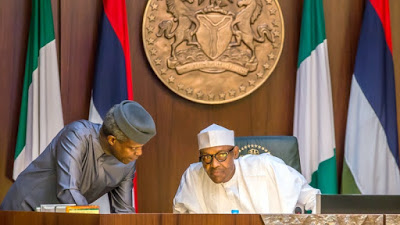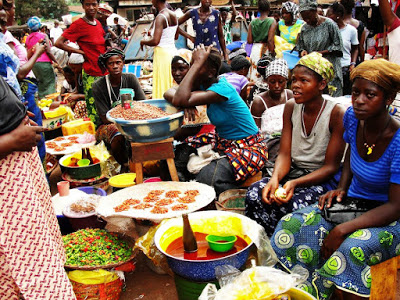
The World Bank said that the Nigerian economy has been slipping since 1995 and this continued till 2018.
The bank, in its latest report on the regional economy titled, ‘Africa’s Pulse’, released the taxonomy of growth performance in sub-Saharan Africa, which focused on the macroeconomic and financial features that led to growth resilience on the continent.
According to the bank, the taxonomy is used to help identify the factors that are correlated with success or failure in economic growth performance in sub-Saharan Africa, with emphasis on macroeconomic and financial variables.
The analysis, it said, involved a series of macroeconomic variables for 44 sub-Saharan African countries from 1995 to 2018.
The key elements that determined the positions of each of the 44 sub-Saharan economies in the taxonomy, the World Bank said, included the level of income per capita of the countries; structural transformation, as captured by sectoral value-added share and sectoral employment share; and capital flows.
Others are level and composition of public sector indebtedness, as captured by the general government gross debt and its currency composition, and the outstanding external public debt.
The last of the indicators has to do with governance vis-a-vis government effectiveness, regulatory quality, control of corruption, voice and accountability, political stability, and absence of violence and rule of law.
According to the World Bank, the taxonomy compares the average annual GDP growth rates during 1995–2008 and 2015–2018 against predetermined thresholds.
It also categorised growth performance into five groups: falling behind, slipping, stuck in the middle, improved, and established. The five groups were further reclassified into three groups: Top tercile, middle tercile and bottom tercile.
The Bretton Wood institution said, “If a country’s economic performance declined from 1995–2008 to 2015–18, the country is categorised in the bottom tercile, which includes ‘falling behind’ and ‘slipping.’ If a country’s growth rate remained invariant over time, between 3.5 and 5.4 per cent in both periods, it is categorised in the middle tercile (or stuck in the middle). If a country’s economic performance improved from 1995–2008 to 2015–18, with the growth of more than 5.4 per cent per year, the country is categorised in the top tercile, which includes the ‘improved’ and ‘established’ groups.”
Based on the above classification, the Nigerian economy was categorised alongside 18 other sub-Saharan African economies as slipping having recorded declined economic performance between 1995 and 2018.
The World Bank said, “The bottom tercile consists of 19 countries: Angola, Burundi, Botswana, the Republic of Congo, the Comoros , Gabon, Equatorial Guinea, Liberia, Lesotho, Mauritania, Malawi, Namibia, Nigeria, Sierra Leone, Eswatini, Chad, South Africa, Zambia, and Zimbabwe. These countries did not show any progress in their economic performance from 1995–2008 to 2015–2018. For instance, their median economic growth rate decelerated, from 5.4 per cent per year in 1995–2008 to 1.2 per cent per year in 2015–18.”
The bottom performing economies, according to the World Bank, produce almost 60 per cent of the region’s total GDP, emphasising that the three largest countries in the region – Nigeria, South Africa, and Angola – and many commodity exporters are in this group.
Burkina Faso, Côte d’Ivoire, Ethiopia, Ghana, Guinea, Guinea-Bissau, Kenya, Mali, Rwanda, Senegal, and Tanzania made the top tercile.
The middle tercile countries are Benin, the Central African Republic, Cameroon, the
Democratic Republic of Congo, Cabo Verde, The Gambia, Madagascar, Mozambique, Mauritius, Niger, Sudan, São Tomé and Príncipe, Togo, and Uganda.
The World Bank also cut its growth forecast for sub-Saharan Africa this year to 2.8 per cent from an initial 3.3 per cent.
The commodity price slump of 2015 cut short a decade of rapid growth for the region, and the bank said growth would take longer to recover as a decline in industrial production and a trade dispute between China and the United States take their toll.
The bank’s 2019 forecast means economic growth will lag population growth for the fourth year in a row and it will remain stuck below three per cent, which it slipped to in 2015.
“The slower-than-expected overall growth reflects ongoing global uncertainty, but increasingly comes from domestic macroeconomic instability including poorly managed debt, inflation and deficits,” the bank said.
The Bretton Wood institution equally cut Nigeria’s growth forecast by 0.1 per cent.
It said, “Growth in Nigeria is projected to rise from 1.9 per cent in 2018 to 2.1 per cent in 2019 (0.1 percentage point lower than last October’s forecast).
“This modest expansion reflects stagnant oil production, as regulatory uncertainty limits investment in the oil sector, while non-oil economic activity is held back by high inflation, policy distortions, and infrastructure constraints.
“Growth is projected to rise slightly to 2.2 per cent in 2020 and reach 2.4 per cent in 2021, as improving financing conditions help boost investment.
“In Nigeria, although the manufacturing and non-manufacturing PMIs remained above the neutral 50-point mark – which denotes expansion – they fell further in February, due to weaker rises in output and new sales orders across firms.
“Household consumption in Nigeria has remained subdued, while multiple exchange rates, foreign exchange restrictions, low private sector credit growth, and infrastructure constraints have continued to weigh on private investment.”

The Chief Economist for Africa at the bank, Albert Zeufack, said the region could boost annual growth by about nearly two percentage points if it harnessed Information Technology more effectively. “This is a game-changer for Africa,” he added.
However, the spokesperson for the Central Bank of Nigeria, Mr Isaac Okorafor, said the CBN under the current governor, Mr Godwin Emefiele, had shown so much ingenuity in managing the economy.
“You know the crisis that we have faced in the past three years. The bank has shown ingenuity in managing the situation and ensuring that everything is stable.”
Invest In Social Force & Get 50%
Click HERE >>
To Buy Cheap MTN & GLO Data
Click HERE >>
You may be interested

Arsenal Equal Chelsea’s London Derby Feat After 5-1 Win Vs Palace
Webby - December 21, 2024Arsenal equaled Chelsea’s London derby achievement following their 5-1 win against Crystal Palace in Saturday’s Premier League game at Selhurst…

Haaland Backs Guardiola To Turn Man City’s Poor Form Around
Webby - December 21, 2024Erling Haaland had said he and his Manchester City teammates are still backing manager Pep Guardiola to turn the team’s…

PSG To Reignite Interest In Osimhen
Webby - December 21, 2024Paris Saint-Germain have contacted Napoli to discuss signing Victor Osimhen in January, according to reports in France.It is reported that…

















![American Pastor, David Wilson Seen Eating The Box Of Woman Who Isn’t His Wife [Video]](https://onlinenigeria.com/wp-content/uploads/2019/10/american-pastor-david-wilson-seen-eating-the-box-of-woman-who-isnt-his-wife-video-150x150.jpg)









